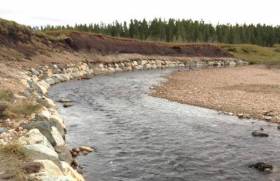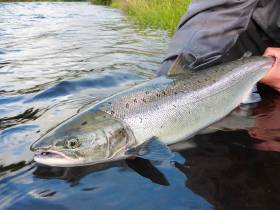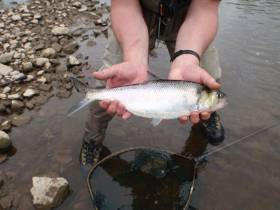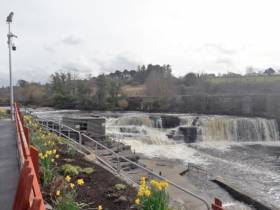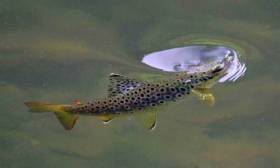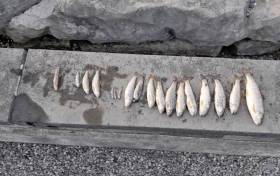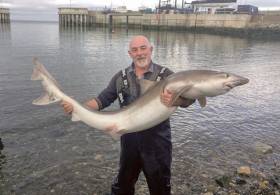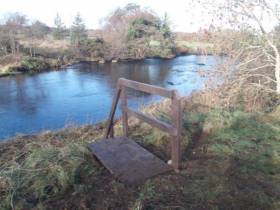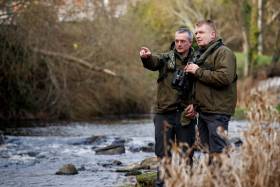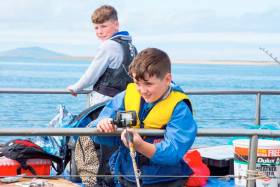Displaying items by tag: Inland Fisheries Ireland
Inland Fisheries Ireland Launches 2019 Funding Call For Conservation & Development Projects
Inland Fisheries Ireland has announced a new funding call for 2019 with three funding schemes now open to angling clubs and community groups.
The funding has been made available for fisheries conservation projects and development projects nationwide through the National Strategy for Angling Development (NSAD).
Applications are invited from angling clubs, local development associations, tidy towns and others who may be looking to carry out projects.
The 2019 funding call consists of three schemes.
The NSAD Capital Grants Scheme 2019 (€136,000) is aimed specifically at capital improvement works with grants available to groups and individuals looking to improve angling access and infrastructure in their locality.
The Salmon and Sea Trout Rehabilitation, Conservation and Protection Fund focuses on the protection of both salmon and sea trout. It will fund rehabilitation, protection and conservation projects, all of which must focus on salmon or sea trout. This fund replaces the Salmon Conservation Fund and extends it to include both salmon and sea trout with project values starting from €2,000 for awareness projects. The upper limit of €15,000 has been removed.
The Midlands Fisheries Fund (€50,000) will focus on conservation and rehabilitation projects in the midland fisheries permit area. The fund has been created through contributions from the permit income received via the Midlands Fisheries Group permit area.
Sean Canney, Minister of State with responsibility for the inland fisheries sector, said: “Since the inception of the National Strategy for Angling Development, we have invested €3.4 million in fisheries development, protection and conservation projects across the country.
“Progress is being made in the delivery of projects which support vital fisheries conservation and rehabilitation and which enhance Ireland’s angling offering. The fisheries resource should be enjoyed by all and this funding call today once more will help bring angling to the broader community in a conservation focused manner.”
Suzanne Campion of IFI said it looks forward to working with community groups from application to delivery stage on their projects.
“We are already partnering with over a hundred clubs and associations in the delivery of fisheries projects. The commitment of these groups in making a valuable difference to their locality is inspiring.”
For more information about the 2019 funding call, to download an information booklet and to submit an Expression of Interest, visit www.fisheriesireland.ie/funding.
All applicants must apply through the Expression of Interest, which opens today (Tuesday 16 April), to progress to full application. Full applications may be submitted from Monday 20 May with the closing date for applications on Thursday 20 June.
IFI will be hosting information workshops over the coming weeks for those looking for further information or support with the application process:
- Dublin — Citywest Hotel — Monday 29 April
- Cavan — Cavan Crystal Hotel — Tuesday 30 April
- Donegal — Harvey’s Point — Wednesday 1 May
- Ballina — The Great National Hotel — Thursday 2 May
- Galway — Maldron Hotel, Oranmore — Friday 3 May
- Limerick — Maldron Hotel — Tuesday 7 May
- Tralee — Ballygarry Hotel — Wednesday 8 May
- Cork City — Rochestown Park Hotel — Thursday 9 May
- Kilkenny — Ormonde Hotel — Friday 10 May
Appeal For Anglers To Become Citizen Scientists As Part Of National Salmon Scale Project
Anglers are needed as citizen scientists for a new National Salmon Scale Project, says Sean Canney TD, Minister of State with responsibility for the inland fisheries sector.
Minister Canney said: “As we celebrate International Year of the Salmon, this project will help researchers understand the challenges which salmon are facing today.
“The project, which has been initiated by Inland Fisheries Ireland, aims to collect vital information through scales taken from salmon and sea trout which are caught in Irish rivers and lakes and will contribute to international efforts to conserve wild salmon.”
Fish scales record the life history of a salmon, and one scale can reveal a lot about the lifestyle and behaviour of the fish.
Scales can tell scientists what age the fish is, how many winters it spent at sea, how many times it spawned, how slow or fast it grew, what it ate and how long it spent in the river before it went out to sea.
Scales can also reveal the general feeding area where the salmon travelled to in the ocean, whether it went to the Faroe Islands, the Norwegian Sea or all the way to West Greenland. Scales help scientists to understand the biology and ecology of Irish salmon and sea trout.
As part of the project, anglers are asked to take a scale sample from a salmon or sea trout by gently scraping and removing approximately 20 fish scales using a clean knife, then post their samples to Inland Fisheries Ireland (IFI) using the sample envelopes which will be made available to them.
Scales can be removed from both harvested and catch-and-release fish. Sampling of fish for release should be handled carefully and fish should be only briefly removed from the water with every effort made to avoid injury or stress while weight should be estimated.
Information from salmon scales is used in setting conservation limits for Irish rivers. Conservation limits for each river are set based on the proportion of salmon who have spent one winter at sea and those that have spent multiple winters at sea.
The conservation limit for a river represents the number of spawning salmon required to produce the next generation of salmon and this information helps inform angling regulations and management. Information from scales on multi-sea winter salmon entering rivers in spring is also important for managing individual river stocks.
Dr Paddy Gargan, senior research officer at IFI, said: “It is important to have anglers collecting scales as they can provide broad coverage across Ireland and collect scales throughout the fishing season.
“A scale resource which includes many different river systems in Ireland over several years is a great asset from a research perspective as it allows us to examine the factors affecting salmon survival at sea. We can compare how factors, such as climate change, are impacting survival by analysing today’s salmon scales alongside those from many decades ago.”
All scales collected through the National Salmon Scale Project will be added to the National Salmon Scale Archive which is managed by IFI.
The archive, which consists of a dedicated storage facility and associated database, currently holds 19,300 scale samples from a total of 38 rivers representing 152 sampling years. The National Salmon Scale Project aims to increase the scale resource available to scientists for ongoing and future research.
IFI’s head of research and development Dr Cathal Gallagher said: “Ultimately the National Salmon Scale Project will help inform future salmon management policies and activities.
“It is fitting therefore that we are launching this campaign during International Year of the Salmon which aims to raise awareness of what humans can do to ensure salmon and their habitats are conserved and restored against a backdrop of several environmental pressures. This project offers anglers a very tangible and practical way of playing an active role in salmon conservation.”
For more information on the National Salmon Scale Project, including how to take a sample safely and to request sample envelopes, visit the project webpage. To find out more about International Year of the Salmon visit YearOfTheSalmon.org.
Ireland’s Role In Europe-Wide Research Programme To Preserve Threatened Migratory Fish
#MarineWildlife - A new project which aims to promote international action and co-operation to conserve vulnerable migratory fish species launched yesterday, Thursday 28 March.
The DiadES initiative will see 30 partners from different countries participate in this European project, with Inland Fisheries Ireland (IFI) leading out on the project in Ireland.
The project launches as migratory fish and their habitats continue to come under pressure as a result of human activity and climate change.
It will focus on fish such as shads, lampreys, salmon, trout and mullet which are known as ‘diadromous’ fish as they migrate between fresh and salt waters to reproduce or feed.
The DiadES initiative intends to improve knowledge of the ecological, economic and cultural benefits offered by these migratory species while assessing the possibility of these species changing their locations due to climate change.
It will also examine the emergence of new interactions between fish territories as a result of these relocations.
In addition to collaboration across research and knowledge sharing between countries, the project will take a global multidisciplinary approach.
It will focus on several species across different geographical areas and involve researchers in the field of natural sciences and environmental economists as well as an experienced network of fish managers.
As part of the research, a transnational interactive atlas will be produced which will outline the current distribution of diadromous fish and how they help the ecosystem. This will forecast trends in the geographical distribution of various species and look at possible redistribution of some species as a result of climate change.
The programme will also design a platform for stakeholders to explore different management strategies.
Dr Cathal Gallagher, head of research and development at IFI, said: “Throughout their life cycle, diadromous fish provide ‘ecosystem services’. This means they provide food, regulate and support the ecosystem through the nutrient cycle and offer a recreational pursuit to local communities. All of these fish generate significant ecological, economic and cultural benefits for local communities across Europe.
“We are keen to play our role in assessing and enhancing the role these fish play while also assisting them as they navigate the effects of climate change which has resulted in a reduction in their distribution.”
The DiadES project is led by the French research institute Irstea and is financed by the Interreg Atlantic Area Programme of the European Regional Development Fund (ERDF) to the value of €2.2 million.
IFI Funds €20K Protection Project For Ballisodare Fishery
#Angling - A new project at Ballisodare Fishing Club outside the Co Sligo village will help protect this important fishery in the North West.
The private fishery, which was developed last year to include a state-of-the-art fishery office and two public viewing platforms, is a renowned salmon angling destination.
However, the fishery was vulnerable to illegal fishing and a protection programme was required to ensure the sustainability of local fish stocks.
The project, which was devised and delivered by the club, was supported with funding from Inland Fisheries Ireland’s (IFI) National Strategy for Angling Development.
The director of Ballisodare Fishery Ltd and Ballisodare Fishing Club successfully secured funding of €20,000 from IFI in October 2017 with the project completed a year later in October 2018.
This section of the fishery was vulnerable to illegal activity in the past as Ballisodare Fishery is the entry point for salmon from the tide into the freshwater and large numbers of fish are often present.
It is hoped that the security system will now support protection activities with the installation of modern security lighting alongside a CCTV system to allow for 24-hour monitoring of the fishery.
The high-standard security system incorporates security cameras which have a night vision mode and flood lighting.
Suzanne Campion, head of business development at IFI, said: “This new protection system in Ballisodare will play an important role in deterring illegal fishing and catching those who continue to commit offences. This is crucial if we want to conserve this resource for future generations.
“It is fitting that this project has been completed just as we celebrate International Year of the Salmon which takes place in 2019 and offers us an opportunity to start a conversation about the importance of conservation and how we can inspire action in this regard across Ireland.”
Angling Centre Owner Convicted For Illegal Netting On Lough Corrib
The owner of an angling centre from Moycullen was convicted at Galway District Court last Tuesday 5 February for the illegal use of a net and for possession of an unlawfully captured trout.
The court heard that Michael Canney, with an address at Portarra Lodge, was approached by Inland Fisheries Ireland (IFI) fisheries officers on the morning of 25 June 2018 as he was hauling an illegal net into a lake boat on Lough Corrib.
Diorai Ford, solicitor acting for IFI, outlined to the court that fisheries officers had covertly kept the illegal net under surveillance throughout the night.
The net had been fishing since the previous evening when it was discovered during a routine fisheries patrol.
Canney was accompanied in the boat by a foreign student who was staying with him where he operates an angling centre.
When Canney retrieved the net into the boat, it contained one dead brown trout. While in the act of lifting the net, Canney was approached by a fisheries officer on a personal water craft.
Canney was co-operative throughout. The equipment used in the commission of the offences was seized and included a lake boat and engine.
Solicitor for the defendant, Sinead Fitzpatrick, stated in his defence that Canney had a group of Italian anglers staying with him at the time and he was undertaking a survey to see what fish stocks were in the area.
Judge Mary Fahy commented that she knew several people who fish legally on a regular basis on Lough Corrib and that Canney was a mature man and that he knew that what he was doing was illegal.
Judge Fahy convicted Mr Canney on both counts, and imposed a fine of €500 for the use of an unlawful net, along with a fine of €500 for the possession of an unlawfully captured trout.
Costs of €600 were awarded to IFI’s solicitor. The boat and engine that Canney used in the commission of the offences were also forfeited.
IFI chief executive Dr Ciaran Byrne said: “Lough Corrib is considered Ireland’s finest wild brown trout fishery and is also a Special Area of Conservation (SAC) designated for the protection of numerous aquatic species including Atlantic salmon.
“Lough Corrib attracts a vast number of anglers from all over the world who enjoy the unique angling for wild brown trout, Atlantic salmon, pike and coarse fish that the lake offers.
“This conviction reflects the long hours that dedicated fisheries officers spend on a daily basis in protecting our valuable fisheries resource.”
Irish Water Prosecuted Over Fish Kill In Tipperary
#FishKill - Inland Fisheries Ireland (IFI) prosecuted Irish Water yesterday (Tuesday 5 February) at Ballina District Court for the discharge of a harmful substance into the Ballycorrigan River on 17 May last year, causing a fish kill.
Among the fish mortalities were 100 brown trout of different age groups, three juvenile salmon and one stone loach which were killed when a cleaning substance was discharged into the river.
Judge Patrick Durcan heard evidence from Michael Fitzsimons, a senior fisheries environmental officer with IFI, that a detailed investigation was carried out following a pollution report received from the general public.
It found that the fish kill was caused by a combination of effluents arising from an uncontrolled maintenance event from Irish Water’s Ballina/Killaloe wastewater treatment plant.
Irish Water entered a guilty plea. Judge Durcan directed Irish Water to pay IFI’s legal costs of €2,290 and fined the body €2,500.
Judge Durcan stated that Irish Water did not take into consideration the environment and conditions when discharging into the river and that Ireland’s rivers are its most important natural resource.
He said that while these resources are maintained under the vigilance of Inland IFI, Irish Water needs to be vigilant, too.
Amanda Mooney, director of the Shannon River Basin District with IFI, said: “Irish Water co-operated fully with Inland Fisheries Ireland’s investigation and updated its cleaning protocols for the use of chemicals in treatment plants nationwide with more appropriate methods now in use as a direct result of this incident.
“Our fisheries resource is an extremely valuable asset, both from a recreational and economic perspective and it is crucial that we continue to protect and conserve it for future generations to enjoy.”
Four New Irish Record Fish Caught By Anglers During 2018
#Angling - Four new Irish record fish were caught by anglers last year, according to the just published Irish Specimen Fish Committee (ISFC) report for 2018.
New records were set for four marine species: golden grey mullet, thin-lipped mullet, black bream and tope.
The two mullet species were taken in Cork, with Noel Lane from Cork taking the 2.95kg thin-lipped mullet from Cork Harbour on 15 July, and Stephen O’Neill hooking the golden grey mullet of 1.52kg on 15 August.
Elsewhere, the 34.02kg tope was caught off Greystones, Co Wicklow by Stephen Hanway from Dublin on 3 October, and Kilmore Quay in Co Wexford was the venue for the 1.45kg black sea bream caught by Welsh angler Gordon Thornes on 17 September.
The anglers will be presented with their awards and certificates at the ISFC Awards Day on Saturday 16 February in conjunction with the Ireland Angling Show at the National Show Centre in Swords.
Further details of these record fish are in the Irish Specimen Fish Committee Report 2018. The committee, which is supported by Inland Fisheries Ireland, is an independent all-Ireland voluntary body which verifies and records the capture of large fish caught on rod by anglers in freshwater and marine waters.
As well as the new record, detailed information on 393 specimen fish (large fish) taken by anglers from venues throughout Ireland in 2018, comprising many different species, is detailed in the report.
The main species were smaller shark species like smooth hound and spurdog, while in freshwater, carp and pike dominated. All fish were caught, weighed, measured and released.
Hard copies of the report are available from Inland Fisheries Ireland offices nationally.
New Project To Improve Angling Access On River Easkey
#Angling - A new project on the River Easkey in Co Sligo which has improved and developed angling access to the wild salmon river between Sligo and Ballina has now been completed.
The project, which was delivered by River Easkey Angling Association, received support from Inland Fisheries Ireland (IFI) via the National Strategy for Angling Development.
Structures such as footbridges, stiles, and ladders were installed along the river, which is located on the Wild Atlantic Way, while walkway routes on the banks of the salmon and trout fishery were also improved.
The work took place upstream of the famous Workhouse Bridge as part of the second phase of this project which initially involved similar works downstream of the bridge last year.
In total, the project has delivered eight new access points to angling, 13 footbridges ranging from three to four metres in length, and five kilometres of improved trail access.
Sean Canney, Minister of State for responsibility for inland fisheries, said on Wednesday (23 January): “I welcome the continuing efforts of Inland Fisheries Ireland in delivering under the National Strategy for Angling Development in partnership and collaboration with local angling clubs and community groups nationwide.
“Inland Fisheries Ireland committed €23,500 in total to support the Easkey project with €10,000 awarded in 2017 and a further €13,500 granted in 2018.
“I also want to congratulate the River Easkey Angling Association on its excellent development ethos. They are a progressive group that helpfully operates an open policy for holders of a State Salmon License with season and day tickets available for access,” he added.
Suzanne Campion, head of business development at IFI, said: “The River Easkey Angling Association has done fantastic work in developing this area as an angling destination. While completing this project and working closely with our project officers, they have given due diligence to everything from financial and environmental governance to biosecurity considerations ensuring the conservation and protection of this wonderful resource.”
Alan Spencer, assistant secretary of the River Easkey Angling Association, expressed the club’s thanks to Inland Fisheries Ireland’s staff for all their help and support during the project, as well as gratitude to landowners who permitted the club and its contractor access to the river through their property.
Inland Fisheries Ireland Launches Nationwide Recruitment Campaign For Fisheries Officers
Inland Fisheries Ireland has launched a recruitment campaign for seasonal fisheries officers nationwide.
The seasonal positions offer an opportunity to protect and develop Ireland’s rivers, lakes and waterways during the summer months. There are up to 40 positions on offer across six River Basin Districts.
Sean Canney, Minister of State with responsibility for inland fisheries, said: “Fisheries officers play a vital role in protecting, conserving, managing and developing Ireland’s precious natural fisheries resource.
“They help enforce fisheries legislation which protects against illegal fishing activity and support the development of the resource through the maintenance of angling infrastructure.
“The recruitment of up to 40 seasonal officers will reinforce the critical work of Inland Fisheries Ireland during the high activity period of the year when there is increased demand for protection, conservation and support.”
Roisin Bradley, head of HR at Inland Fisheries Ireland, said the seasonal roles “offer an excellent opportunity to spend your summer outdoors helping to protect and enhance Ireland’s rivers, lakes and coastline.
“Our fisheries officers are custodians of this precious natural fisheries resource. We are looking for people across the country who enjoy working outdoors, who are passionate about protecting our fisheries resource and who have excellent interpersonal skills.”
The roles are available on a six-month basis with contracts commencing from late April and training provided to all new recruits. The locations for the new positions will be based across the country in the following districts:
- Eastern River Basin District: five vacancies across Kilcoole, Co Wicklow; Dundalk, Co Louth; Drogheda, Co Louth; CityWest, Co Dublin.
- South Eastern River Basin District: seven vacancies across Carrick-on-Suir, Co Tipperary; Enniscorthy, Co Wexford; New Ross, Co Wexford.
- South Western River Basin District: five vacancies across Farnanes, Co Cork; Kenmare, Co Kerry; Killorglin, Co Kerry; Bantry, Co Cork.
- Shannon River Basin District: six vacancies across Listowel, Co Kerry; Limerick, Co Limerick; Birr, Co Offaly; Sheelin, Co Westmeath.
- Western River Basin District: five vacancies across Galway City and Ballinakill, Co Galway; Ballina and Bangor Erris, Co Mayo; Sligo, Co Sligo.
- North Western River Basin District: six vacancies across Cavan town, Co Cavan; Letterkenny, Glenties, Ballyshannon and Gweedore, Co Donegal.
The closing date for applications is 5pm on Friday 8 February 2019. To find out more about the roles and how to apply, visit fisheriesireland.ie/careers.
Newport Junior Sea Anglers To Benefit From Free Fishing Equipment
#Angling - Sean Canney, Minister of State with responsibility for inland fisheries, has welcomed the success of Newport Sea Angling Club in Co Mayo in securing fishing equipment for junior anglers in the community.
Along with many others around Ireland, including the Finglas Youth Resource Centre in north Dublin, the club received funding from Inland Fisheries Ireland’s National Strategy for Angling Development to help support the recruitment of novices to the pursuit of angling.
Minister Canney said: “Newport Sea Angling Club has a strong junior membership hosting multiple events for young anglers every year. The club provides novice anglers with equipment, tackle, rods and life jackets during junior events.
“This helps in promoting angling to a new generation and also ensures that parents do not have to invest in any equipment until children have tried angling a number of times.
“I am happy to see Inland Fisheries Ireland stand behind the Newport club’s excellent initiative and I am confident their efforts will bring new participants into this healthy outdoor pastime.”
The club’s youth outreach initiatives attract many junior anglers with up to 60 juniors attending their National Junior Competition every year.
This new equipment will assist the club in training novice anglers in sea angling skills. In addition to fishing equipment, the club will also purchase a projector and screen for the club which will be used to assist them in theoretical training sessions.
Declan Moran of Newport Sea Angling Club said: “We hope that we can remove any pressure on parents or guardians to purchase angling equipment at the outset until their child has tried the pursuit and intends to continue with it. We believe this is one of the reasons why the club is so successful in introducing many young novice anglers to sea fishing each year.
“At Newport Sea Angling Club, we are committed to helping the next generation of anglers by passing on the necessary angling skills and introducing them to the pursuit in a safe and friendly environment.”
Suzanne Campion, head of business development at Inland Fisheries Ireland, said: “Newport Sea Angling Club has a long history of supporting junior anglers with a number of popular junior events held in Newport every year. We are delighted to support the club through the National Strategy for Angling Development fund to enable the purchase of more fishing equipment.
“I would like to take this opportunity to congratulate them on their work to date in recruiting new junior members and we look forward to seeing even more growth in sea angling in Newport and the surrounds in years to come! By increasing participating in angling among the next generation, we are securing the future of our precious and valuable natural resource.”


























